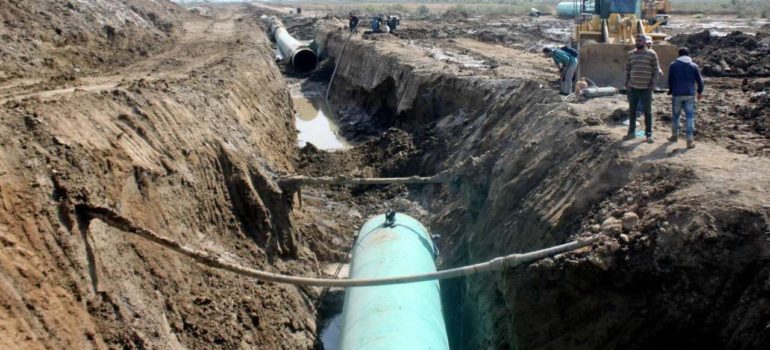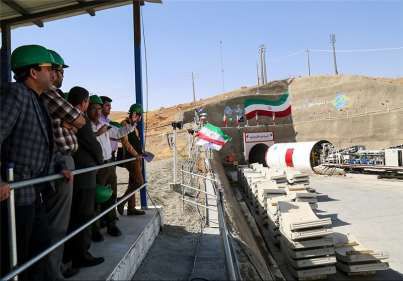Iranian Environmentalists Mark International Day Against Water Transfer

17 April 2021
By the People’s Campaign to Save the Kind Zagros, supporter of Save the Tigris Campaign
Iranian environmentalists annually celebrate the International Day Against Water Transfer on 17 April, or 28 Favardin, according to the Persian calendar. Water transfers between watersheds are common practice in Iran. They have been regarded as one of the most effective ways to reduce water scarcity, as many Iranian politicians have advocated. Such water scarcity is caused by the differences in distribution of water resources, population growth, and damage caused by floods and droughts. The reality, however, is that the discussions around water transfer projects have been overly simplified despite their social, economic, political, technical, and environmental complexities. Such complications have been exacerbated due to lack of comprehensive and accurate impact assessments. Water transfer projects have often been implemented in a speedy manner. They are assessed only from an engineering perspective and lack accurate expert evaluation that would take into account the effects of regional basin management and the impacts on future generations. Opponents argue that water transfer projects have been securitized and are imposed on society and the environment despite widespread opposition.
Each inter-basin water transfer plan contains at least two separate basins: the basin of destination — where the water is to be transferred to, and the source basin — upstream from where the water is to be transferred. Inter-basin water transfer is an operation that transfers water from one watershed to another in order to supply water for agriculture, control flooding, generate electricity, and supply water for industrial and domestic use. Usually, the upstream watersheds consist of mountainous and hilly lands and contain forests, rangeland, or cultivated land. The destination shed consists of a lower slope containing mostly agricultural and urban infrastructure as well as water storage tanks and irrigation canals. Currently in the inter-basin water transfer programs implemented within Iran, only the destination basin benefits from the transfer, while the populations of upstream water basins often do not benefit despite being in need of economic development. The livelihood of upstream populations mostly consists of livestock and agriculture. Water transfer projects threaten these livelihoods in addition to the damage they cause to social and cultural ties between affected communities. In contrast, the destination basin benefits from the water stored in dam reservoirs for consumption, industry, and agriculture. Their populations are usually rural and urban middle class who have access to amenities.
Opponents claim that water transfer projects in Iran are based on false assumptions and exaggerated water needs of the destination basin, arguing that levels of water supplies of the source basins are questionable, and the effects of climate change are not properly considered. Other options, such as demand management, have not sufficiently been explored and, most importantly, the potential for conflicts between source and destination basins have not been assessed. Environmental impact assessments in the source and destination basins are rarely conducted and adverse social consequences have not been studied well. Economically, the justifications for water projects are questionable, and the planning and decision-making processes lack transparency and public participation.
Populations around source basins have protested against water transfer projects and their future negative consequences but have not received sufficient media or public attention. On 17 April 2014, one of the largest environmental demonstrations in recent Iranian history took place. The rally was attended by 30,000 people from Chaharmahal and Bakhtiari Province. Since then, the date has been commemorated as the International Day Against Water Transfer. It has been supported by environmental organizations across Iran, from those opposing water transfers in the Lesser Zab basin, from the Caspian Sea to the Central plateau, and from Jiroft to Kerman. The International Day Against Water Transfer is marked as an opportunity to draw attention to the negative impacts of water transfer projects in Iran and a call for solidarity from international civil society in the struggle against dam, water transfer, and other environmentally destructive projects.
Save the Kind Zagros Campaign Statement:
In the name of God
The statement of Chaharmahal and Bakhtiari Day;
International Day of Action Against Water Transfer
Farvardin 28, 1400
The slogan of this year’s World Water Day (22 March 2021 / 2 Farvardin 1400), “Valuing Water,” emphasized that the true value of water is much higher than its price. However, despite awareness raising, we still witness ignorance of about the vital importance of water resources through destructive and costly dam construction and inter-basin water transfers in Iran.
Gigantic water transfer projects are underway in Iran such as Khersan, Sabzkooh, Behesht-Abad, Koohrang 3 Dam, Vanak-Rafsanjan and Gulab on the Karun River, Alborz to Tehran on the Karaj River, Jiroft to Kerman on the Halil River, and other dam projects such as Lori, Bakhtiari, Lesser Zab, and dozens of other similar projects are under construction.
In addition, the Ministry of Energy plans to implement an alarming project to transfer water from the Caspian Sea to Semnan and expensive and energy-intensive projects to transfer water from the southern seas to areas around the country. The current policies and actions of the Ministry demonstrate that the health of rivers and other bodies of water is being given little priority. The structural mindset that dominates the Ministry continues to degrade the health of bodies of water in the country and negatively affect those who depend on them.
On the occasion of International Day of Action Against Water Transfer (17 April 2021 / 28 Farvardin 1400), we, as environmental activists, in convergence with people who love the nature of this province, will continue to defend the vitality of its largest river, Karun, and engage in the global proceedings protecting rivers and the environment to stop environmental destruction under the deceptive practice of “improving the water supply”.
As authors of this statement:
- We believe that dam construction and inter-basin water transfer is among the largest threats to the life of rivers and their inhabitants, and we consider it our duty to strive for the protection of waterways, rectifying environmental water rights, and observe the natural rights of people living around rivers, lakes, and estuaries.
- We believe that continuing water transfer programs will have dangerous social, economic, and environmental consequences and result in internal displacement and emigration.
- We ask the honourable Judiciary to seriously address corruption in water transfer and dam construction projects, to criminalize environmental damage, take the necessary measures to prosecute criminals in this area, and accelerate environmental cases opened in the courts.
- We request that necessary mechanisms be established, including special environmental courts, and that the Constitutional Court address violations of national law regarding water projects.
- We call for the legistlation of a “Comprehensive Water Law” which takes into account the Supreme Leader’s(I) document on general environmental policies, considers the socio-environmental impacts of water projects, and includes the meaningful participation of civil society and local stakeholders.
- We ask the honourable Islamic Consultative Assembly(II) to immediately investigate dam construction and water transfer projects that have recently been added to its agenda.
- We call for the dissolution of the Supreme Council of Water(III) and reconstituting the mechanism as a participatory and democratic “Water Parliament”.
- We call for serious protection of the country’s pastures and forests, non-structural management on aquifers and watersheds, and the prevention of mining and other activities that may lead to irreparable damage to the environment.
- We call for major reforms in irrigation methods, the cessation of quantitative development of agricultural lands, and for changes in water consumption patterns in all sectors to reduce consumption and adapt to new climatic conditions.
(i) The head of state and the highest political and religious authority of the Islamic Republic of Iran.
(ii) Iranian Parliament.
(iii) The Supreme Council of Water is chaired over by the President of Iran, and it supervises the collaboration and coordination between the associated ministries and organisations. All related organisations and ministries, as well as parliamentary representatives, are members of this Council.
The People’s Campaign to Save the Kind Zagros is an Iranian civil society initiative leading the International Day Against Water Transfer. The campaign calls for international solidarity against water transfer projects
Source: Save the Tigris Campaign


